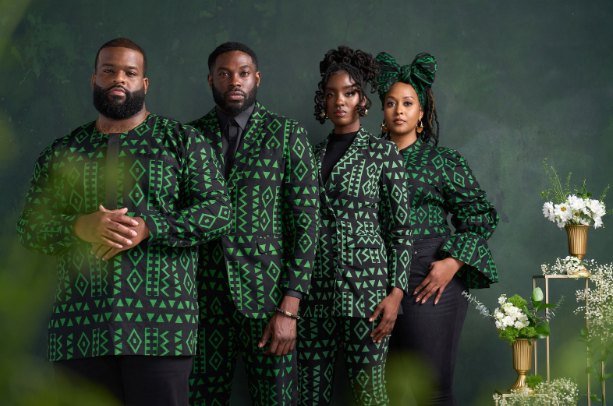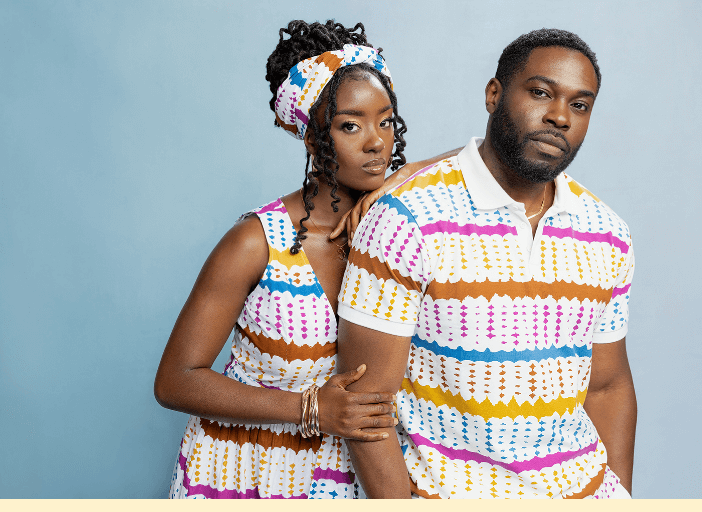Traditional African Wedding Dresses
Weddings are joyous occasions celebrated across cultures, each with its own unique customs and traditions.
In Africa, weddings are not only a union of two individuals but also a vibrant celebration of community, culture, and heritage.
One of the most visually stunning aspects of African weddings is the traditional attire worn by the bride. From intricate beadwork to vibrant prints, traditional African wedding dresses are a testament to the continent's rich diversity and artistic expression.
In this article, we’ll provide examples of traditional African wedding dresses, exploring their symbolism, craftsmanship, and significance.

The Diversity of African Wedding Attire
Africa is a continent of diverse cultures, languages, and traditions, and this diversity is reflected in its wedding attire. From North Africa to South Africa, East to West, each region boasts its own distinct styles and aesthetics.
For example, in West Africa, brides may don colorful Ankara or Kente cloth garments, adorned with intricate embroidery and beadwork.
In East Africa, brides may opt for flowing robes in bold Kitenge prints, accessorized with elaborate headpieces and jewelry. Meanwhile, in Southern Africa, brides may don vibrant Shweshwe dresses, featuring geometric patterns and ruffled accents.
The variety of styles and designs speak to the richness and complexity of African heritage.

Symbolism and Meaning
Traditional African wedding dresses are more than just beautiful garments; they are imbued with symbolism, meaning, and cultural significance.
Each element of the attire—from the colors and patterns to the accessories and embellishments—carries deep-rooted symbolism that reflects the values, beliefs, and identity of the community.
For example, in some cultures, the color red symbolizes love, fertility, and prosperity, while in others, the color blue represents purity and tranquility.
Similarly, beadwork and embroidery may depict traditional motifs and symbols that convey blessings, protection, and ancestral connections. By wearing traditional African wedding dresses, brides honor their heritage and affirm their cultural identity.
Craftsmanship and Artistry
The making of traditional African wedding dresses is a labor of love, requiring skill, precision, and creativity.
Many garments are handcrafted by skilled artisans and seamstresses who specialize in traditional techniques such as weaving, dyeing, and embroidery.
These artisans draw inspiration from age-old traditions and ancestral knowledge, infusing each garment with meticulous attention to detail and craftsmanship.
Whether it's the intricate beadwork of Zulu bridal attire or the handwoven textiles of Ethiopian wedding dresses, the artistry and dedication of these craftsmen shine through in every stitch and seam.
Modern Interpretations and Trends
While traditional African wedding dresses honor cultural heritage, they also evolve with the times, incorporating contemporary influences and trends.
Modern brides may choose to blend traditional elements with contemporary styles, creating unique and personalized looks that reflect their individual tastes and preferences.
For example, some brides opt for modern silhouettes and minimalist designs, while still incorporating traditional fabrics and motifs.
Others may experiment with unconventional color palettes or mix and match different cultural influences to create a fusion of styles.
Additionally, designers are reimagining traditional African wedding dresses through innovative cuts, embellishments, and fabric combinations, offering brides a plethora of options to express their style and personality.
African Wedding Dresses Examples
Here are top traditional styles that you’ll find at African weddings.

Zulu Traditional Wedding Dress
In Zulu culture, weddings are a vibrant celebration of love and unity, accompanied by elaborate traditional attire.
Zulu brides often wear isicholo, a cylindrical hat adorned with beads, paired with an intricately beaded bodice called inkehli.
The skirt, called isidwaba, is typically made from a colorful fabric like Shweshwe or printed cotton, adorned with beadwork and embroidery.
Zulu traditional wedding dresses are known for their bold colors, geometric patterns, and exquisite beadwork, reflecting the cultural pride and heritage of the Zulu people.
Habesha Traditional Wedding Dress
In Ethiopia, weddings are steeped in ancient traditions and customs, with the bride and groom donning traditional attire known as habesha kemis and habesha libs.
The habesha kemis is a long, flowing dress made from white cotton fabric, adorned with intricate embroidery and patterns.
The habesha libs, worn by the groom, is a formal ensemble consisting of a white robe and a shawl. Ethiopian traditional wedding dresses showcase the country's rich textile heritage and the artistry of its craftsmen.

Yoruba Traditional Wedding Dress
Yoruba weddings are grand affairs filled with music, dance, and vibrant attire. Yoruba brides traditionally wear aso oke, a handwoven fabric made from locally sourced materials, featuring elaborate patterns and designs.
The aso oke is draped in layers to create a regal silhouette, complemented by gele, a headwrap adorned with beads and embellishments.
Yoruba traditional wedding dresses are renowned for their opulence and elegance, reflecting the cultural heritage and status of the Yoruba people.
Rwanda Traditional Wedding Dress
In Rwanda, weddings are a time-honored tradition marked by intricate rituals and ceremonies. Rwandan brides typically wear a mushanana, a floor-length dress made from brightly colored fabric, adorned with embroidery, beads, and sequins.
The mushanana is often accessorized with a sash or scarf, as well as elaborate jewelry such as necklaces, bracelets, and earrings.
Rwandan traditional wedding dresses exude grace and sophistication, embodying the beauty and resilience of Rwandan culture.

Moroccan Traditional Wedding Dress
Moroccan weddings are a lavish affair steeped in centuries-old traditions and customs. Moroccan brides often wear a traditional dress called a kaftan, characterized by its ornate embroidery, embellishments, and flowing silhouette.
The kaftan may be made from luxurious fabrics such as silk, satin, or brocade, and is typically adorned with intricate patterns and designs inspired by Moroccan architecture and culture.
Moroccan traditional wedding dresses capture the enchanting beauty and mystique of the Maghreb region, reflecting the richness of Moroccan heritage.
Ugandan Traditional Wedding Dress
Ugandan weddings are vibrant celebrations filled with color, music, and cultural symbolism. Ugandan brides traditionally wear gomesi, a floor-length dress made from silk or cotton fabric, featuring bright colors and bold patterns.
The gomesi is often accessorized with a sash, called a busuuti, as well as jewelry such as necklaces, earrings, and bracelets.
Ugandan traditional wedding dresses showcase the country's diverse cultural heritage and the creativity of its artisans, blending traditional elements with contemporary flair.
Efik Traditional Wedding Dresses

In Efik culture, weddings are elaborate affairs steeped in tradition and ceremony. Efik brides traditionally wear a regal attire known as the Ofong Ukod Anwang, which consists of a voluminous wrapper, a blouse adorned with intricate beadwork, and a headwrap called a Gele.
The Ofong Ukod Anwang is often made from luxurious fabrics such as silk or satin, featuring bold colors and elaborate designs.
Efik traditional wedding dresses are a symbol of cultural pride and heritage, reflecting the grace and elegance of Efik women.

Conclusion
Traditional African wedding dresses are more than just garments; they are symbols of love, culture, and identity.
From the intricate craftsmanship to the deep-rooted symbolism, these dresses encapsulate the essence of Africa's rich and diverse heritage.
Whether embracing age-old traditions or embracing modern interpretations, brides who don traditional African wedding dresses honor their ancestry and celebrate the beauty of African culture.
As we continue to cherish and preserve these cultural treasures, we ensure that the legacy of African weddings endures for generations to come.




















Leave a comment
This site is protected by hCaptcha and the hCaptcha Privacy Policy and Terms of Service apply.